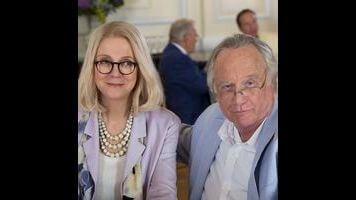Richard Dreyfuss brings life to Madoff

If there was doubt in anyone’s mind that Bernie Madoff was a terrible person, the two-night miniseries Madoff will dispel it. At one point, the fraudulent financier, played with just enough scenery-munching by Richard Dreyfuss, is listening to a speech by Holocaust survivor, Nobel laureate, and Madoff victim Elie Wiesel. “Elie Wiesel, virtuous humanitarian,” Madoff says by way of introduction. “Didn’t stop me for a minute from taking his money.”
Madoff is the by-the-numbers story of how a lower-middle-class Jewish kid from Queens rose to heights from which he was able to defraud his investors of almost $65 billion. Madoff is entertaining and watchable, but it’s also facile and a strange choice for ABC. It has a movie-of-the-week feel that is almost retro. It’s the kind of event that the broadcast networks don’t make as much as they used to, leaving these kinds of television movies and miniseries to the likes of HBO, who can attach big budgets and big names to true stories. (In fact, Robert De Niro is set to play Madoff, opposite Michelle Pfeiffer as Ruth Madoff, in HBO’s upcoming The Wizard Of Lies.) Because the networks have shied away from making this type of television as of late, it’s a boon to Madoff that it’s nowhere near a train wreck: It’s actually a kind of fun. But why make it? And why make it now? That’s never really answered.
Dreyfuss and Madoff portray Bernie like a classic egotistical huckster. He begins his story by explaining how he got people to join his massive Ponzi scheme: exclusivity. “Nothing makes people want something more than telling them they can’t have it,” Madoff says in a voice-over. That’s about as far as Madoff goes into explaining complex economic issues. Unlike The Big Short, which takes pains to make its audience understand how our entire economic system was duped into falling for a guy like Bernie Madoff, Dreyfuss’ Madoff narration makes sure to keep all of these matters on the surface. According to the miniseries, financial fraud investigator Harry Markopolos—the guy who knew what Madoff was doing ages before he went down for his crimes, played here by Frank Whaley—can’t get anyone’s attention because his work is too technical. Madoff, at one point, explains part of his business as market-making. What is that? “Don’t worry, you don’t need to know,” he says. Isn’t not needing to know how we got ourselves into this mess to begin with? Madoff takes the easy route, but what it lacks in complexity, it makes up for in a pace that keeps Madoff’s dealings moving at a clip. And while it still won’t explain the inner workings of why we should be enraged by Bernie Madoff’s actions, it still evokes that rage.
Blythe Danner plays Bernie’s wife, Ruth, making her possibly the WASPiest-looking woman to play a Jew until Pfeiffer takes on the role later in the year. She’s less a character than a worried Queens accent, which is a shame considering the emotional depth that could have been mined from this woman, whose knowledge of her husband’s infidelities are left vague. The emotional center of the miniseries comes from Peter Scolari, who plays Madoff’s younger brother Peter. As Madoff explains, there’s a curse on the family: cancer. Peter had it, Peter’s son Richard dies from it, Madoff’s son Andrew is diagnosed with it (and would later die from it). It’s hard not to think karma’s a bitch, but Scolari brings a certain amount of humanity to the Madoff clan. He knows that something is not right with his brother’s business, and grapples with these sins through prayer. Scolari’s Peter answers the question of how Madoff could get away with doing what he did for so long before his sons, Andrew and Mark, eventually told federal agents about their father’s misdeeds.
None of this would work without Dreyfuss, who gleefully bites into Bernie. He revels in egotism and seems to enjoy playing the villain, a role he does not often take. In the miniseries, Madoff says that for 40 years, he did not have to make a sales call, instead forcing clients to come to him, begging to be let into his fund. But Dreyfuss plays Bernie as a salesman. Instead of selling a product, he’s selling prestige by proximity. Yes, sometimes he could be overblown and cartoonish, but, in a lot of ways, the performance fits the crime.